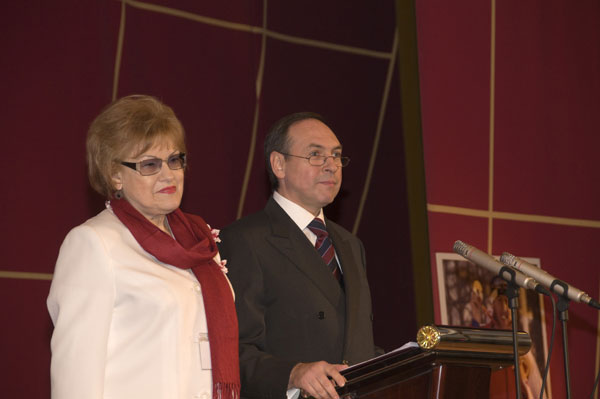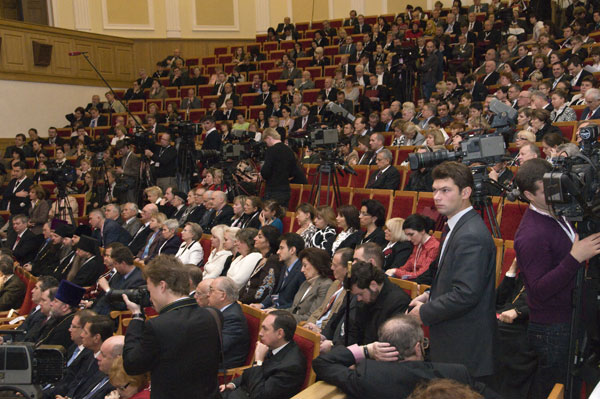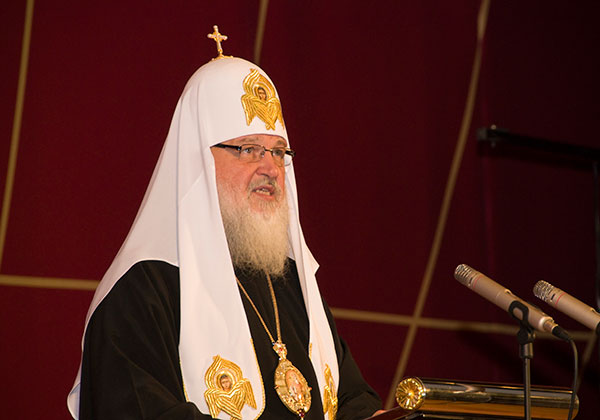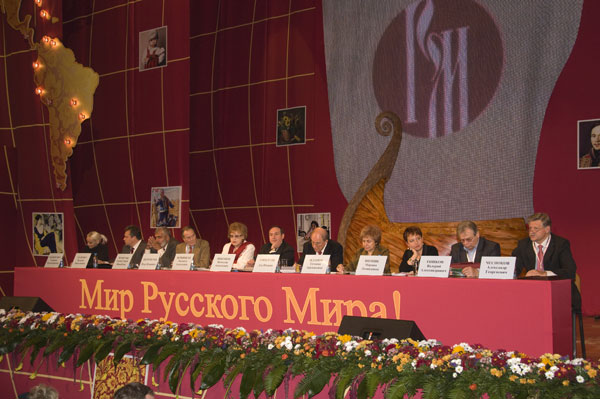
Third Russkiy Mir Assembly: Summary of Results
/ Главная / Russkiy Mir Foundation / News / Third Russkiy Mir Assembly: Summary of ResultsThird Russkiy Mir Assembly: Summary of Results
05.11.2009

The Third Russkiy Mir Assembly traditionally took place on the eve of the Day of Unity of Russia at the Fundamental Library of Moscow State University. The event was attended by nearly a thousand people from 80 countries.
Vyacheslav Nikonov, Executive Director of the Russkiy Mir Foundation, delivered a welcome speech. “The Russian World is not something from the past. On the contrary, it is a dream about the future of people, who are strongly against injustice and who are in search of a "promised land"”.
Liudmila Verbitskaya pointed out this year’s impressive results: 450 projects supported in different countries with nearly two third being aimed at promotion of the Russian language globally; launching of 60 modern textbooks and 15 innovative training programs adjusted to people of different language backgrounds; conduction of many trainings for teachers and student competitions etc.
The Presidential address was delivered by Mikhail Shvydkoy, President's Special Envoy for Cultural Cooperation. Dmitry Medvedev wished the Assembly participants fruitful work and hoped that such a big number of attendees reflected compatriots’ wish to unite in order to address issues faced by Russia. The President also pointed out importance of efforts taken by the Russkiy Mir Foundation to assist all parties in their endeavors.

The Prime Minister’s address was delivered by Deputy Prime Minister of Russia Alexander Zhukov. Vladimir Putin pointed out a close cooperation established between the foundation and the government, Russian educational centers and the scientific community. The Prime Minister also noted that the foundation had already earned a great reputation, and hoped that its activities gave new momentum for promotion of the Russian culture locally and abroad.
Alexander Zhukov shared his own experience with opening of Russian Centers and said he was sure that the project would bring in impressive results for all its participants.
The next address was delivered by Patriarch of Moscow and All Russia Kirill, who shared his thoughts on the future of the Russian culture and the Russian World. In view of His Holiness, globalization threatens to merge all cultures, and the foundation offers an opportunity to prevent such an outcome. The Russian Orthodox Church is a backbone of the Russian World, with the word “Russian” indicating only a cultural unity of people speaking the same language. The Patriarch also mentioned the efforts taken by the Russian Church Abroad for bringing together separated elements of the Russian World, and preventing our compatriots from merging with local communities.
His Holiness also said it was important to allow compatriots living in the CIS countries to maintain a link with Russia and its culture. This goal can be achieved through establishment of Russian language centers (possibly, in cooperation with parishes), to open libraries, specialized websites, scientific centers and to inspire young compatriots for studying not only at Russian universities, but also at higher educational institutions of Ukraine and Byelorussia.

Cooperation between the Russian Orthodox Church and the Russkiy Mir Foundation is highly important, and this year marked signing of an agreement intended to boost efficiency of this cooperation. Signing of the document by Vyacheslav Nikonov and Patriarch Kirill took place at the Third Assembly and was witnessed by all its participants.
The signing ceremony was followed by another round of greetings from State Duma Speaker Boris Gryzlov, Chairman of the Federation Council Sergey Mironov and the Ministry of Foreign Affairs of the Russian Federation.
Later the floor was taken by Ravil Gainutdin, the Chairman of Russia's Mufti Council, who said that muslims of Russian considered themselves to be an integral part of the Russian World. He pointed out an impact the Islamic culture had on development of unique specifics of the Russian civilization and said it was crucial to maintain these unique features – primarily the Russian language – for the benefit of future generations.
Principal Russian Rabbi Berrel Lazar said that he had more than once met with representatives of the Russian Jewish Diaspora both in Russia and abroad and emphasized the importance to maintain a link with the Russian culture. Berrel Lazar also believes it useful to establish youth exchange programs allowing Russian Jews from various countries to study in Russia.
Rector of Lomonosov Moscow State University Victor Sadovnichy spoke about importance to maintain quality and prestige of the Russian education system.
Viktor Chernomyrdin, Presidential Adviser on Economic Cooperation with members of the CIS said that the Russian language enjoys strong positions and is invincible. Viktor Chernomyrdin also urged the foundation to support the Russian-language communities of the former Soviet republics in a more active way.
President of the Russian Railways Vladimir Yakunin thanked the foundation for its support in establishing the Russian Center in Merano (Italy). This joint project is currently under development.
At an opening of the Third Russkiy Mir Assembly the foundation’s director Vyacheslav Nikonov announced a start of the event “Russkiy Mir – Memory of a Heart”, which marks a 65th Anniversary of the victory in the Great Patriotic War. The event is intended to keep memory about the Great Patriotic War in people’s hearts. All people living in both Russia and abroad are welcome to participate. Organizers of the event are planning to inspire as many people as possible for collection of information on monuments to veterans of the Great Patriotic War existing in various countries; on the Russian compatriots, who had participated in military actions; on scientific initiatives in the field etc. The initiative is not limited in time.

The opening ceremony was followed by a panel discussion “The World of the Russkiy Mir”. Its participants talked about their efforts aimed at promotion of the Russian language in other countries, preservation of the Russian cultural heritage abroad and protection of rights of Russian compatriots residing in neighboring states. The discussion was moderated by Vyacheslav Nikonov and Liudmila Verbitskaya. Among participants were Director of the Institute of Ethnology and Anthropology at the Russian Academy of Sciences Valery Tishkov, member of the European Parliament from Latvia Taiana Zhdanok, Head of the Russian Language Department at Kabul State University Sahib Jan Nawabhai, Deputy Head of Federal Agency Rossotrudnichestvo Alexander Chesnokov, Chairman of Lugansk Regional Council Valery Golenko, Chairman of the International Council of Russian Compatriots Pyotr Sheremetev etc.
Problems confronted by the discussion participants are very different, regardless of their all being related to the Russian language, which makes the mission of the Russkiy Mir Foundation extremely sophisticated.
Valery Tishkov told about the Russian heritage explorer projects being run at the Institute of Ethnology and Anthropology.
Tatiana Zhdanok and Valery Golenko shared their views on ways to protect rights of the Russian population of Latvia and Ukraine and told aout concrete measures taken by their organization in the abovementioned field.
President of the American Councils for International Education Dan Davidson told about a situation with the Russian language teaching at U.S. schools. According to the data collected by the Association, the majority of students studying the Russian language live in New York and New Jersey, whilst Texas reports the largest percentage of schools offering the Russian language courses. According to Dan Davidson, a number of schools believe the language to be unpromising. Consequently, it is necessary to cooperate with directors of such schools in order to downplay this biased attitude.
After Dan Davidson’s speech the parties agreed on opening of a Russian Center in Washington at premises of the American Councils for International Education.
Sahib Jan Nawabhai told the audience about specifics of the Russian language teaching in “another world” and under specific circumstances. In the beginning he focused on the history and the current specifics of the Russian language teaching in Afghanistan and then suggested a number of measures aimed at improvement of the language’s position in his country; among them – establishment of two Russian schools.
The general discussion was followed by separate roundtable discussions and workshops, where the event participants could focus on a number of burning issues and to know about the latest activities of the foundation. At the end of the day the audience attended a performance at Stanislavsky Theatre.
The Assembly, which was conducted for the third time, has turned into a traditional event. This point was stressed by Vyacheslav Nikonov, who said he was hopeful to see all this year’s attendants at the next Assembly.
News by subject
Publications

 Mikhail Kalatozov, a director who transformed the world of cinematography in many ways, was born 120 years ago. He was a Soviet film official and a propagandist. Above all, he was capable of producing movies that struck viewers with their power and poetic language.
Mikhail Kalatozov, a director who transformed the world of cinematography in many ways, was born 120 years ago. He was a Soviet film official and a propagandist. Above all, he was capable of producing movies that struck viewers with their power and poetic language.